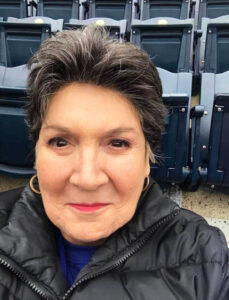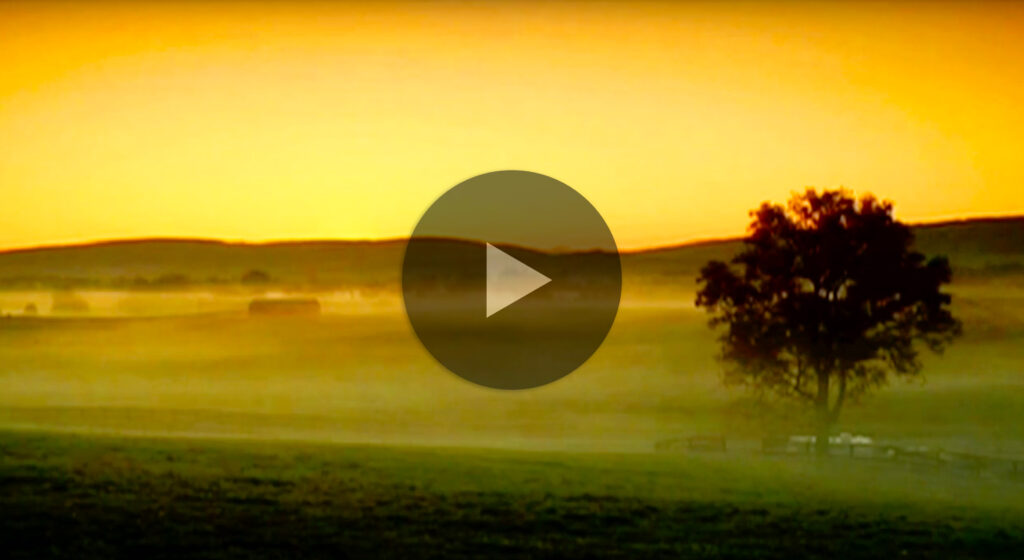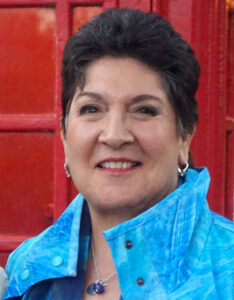Twenty years later, Adele reflects how a city-raised, single mom founded an international animal welfare organization
 A woman born and raised in New York City is an unlikely advocate for 400 million farm animals a year.
A woman born and raised in New York City is an unlikely advocate for 400 million farm animals a year.
A single mother of three — armed with only tenacity and preparation — doesn’t usually contend with leaders of Congress.
A legal secretary without a college degree is an improbable leader of a committee of scientists and researchers assembled to uphold science-based standards for the care of farm animals.
However, those who have underestimated the force behind Certified Humane® often find themselves surprised by the passion and determination of Adele Douglass Jolley.
In 2003, Adele set out to single-handedly change the farming industry. The nonprofit she created now operates in 24 countries.
“We’ve been successful in changing how farmers in the United States raise animals,” she said recently. “And not only in the United States, but all over the world.”
Ever since her own eyes were opened to the cruelties of the animal production industry, Adele has been systematically working to close the gap between America’s idyllic vision of the farm and the harsh reality of how most animals end up on supermarket shelves.
Adele herself collected impressive accolades along the way.
- In 2006, she earned the Lifetime Achievement Award from the American Society for the Prevention of Cruelty to Animals.
- In 2007, she was one of 15 winners of the Purpose Prize for social entrepreneurs over 60.
- In 2008, she also became an Ashoka Fellow, joining the international fellowship of social entrepreneurs.
- In 2016, she was awarded the RSPCA Overseas Award for outstanding achievement in animal welfare.
Today, Adele Douglass Jolley is 76. She lives in Battle Creek, Michigan, where she moved after she remarried six years ago. As she reflects on the last 20 years, Adele credits her success to her stubborn personality.
“That’s probably what did it,” she said. “When I started the organization, I thought, ‘If it isn’t going to work out, it’s not going to work out. But in the meantime, I’m going to do it. And I’m going to do it right.’”
Her unwavering standards for excellence became the foundation for Certified Humane®’s steady growth and formidable leadership in the industry.
Humble beginnings
Adele was born in 1946 to Ruth and Salvatore Perrone. She was the oldest of three girls, and she learned her love for animals from her big, close-knit Italian family.
“I never doubted that animals had feelings,” she once told Northern Virginia magazine.
She married her first husband, Archie Douglass, at age 19 — meeting him in the office job where she worked right after high school. Six years later, the couple had three children: Holly, Brian and Meredith.
Archie was an engineer, and his work moved the family to California. While she was raising her family, Adele began volunteering for political causes, including the San Fernando Valley political caucus.
In 1977, Adele separated from her husband. She and the children moved to Herndon, Virginia, on the outskirts of the Washington, D.C. metropolitan area. At first, she took jobs doing billing and as a legal secretary.
Then, in 1980, a friend was leaving her office position and recommended Adele in her place. Adele became personal secretary, office manager and legislative assistant to Bill Green, who represented Manhattan, New York in the U.S. House of Representatives.
What they came to regret
 In the congressman’s office, Adele took ownership of animal welfare issues including laboratory animals, marine mammals and wildlife.
In the congressman’s office, Adele took ownership of animal welfare issues including laboratory animals, marine mammals and wildlife.
Her focus paved the way for the American Humane Association to hire her as director of its new Washington D.C. office in 1987. Her job was to advocate for the protection of children and animals, advancing the organization’s legislative agenda in Washington, D.C.
As part of her role with the association, she was asked to join various animal welfare committees. That included a committee created to revise the Guide for the Care and Use of Agricultural Animals in Research and Teaching in 1999.
“This is always a contentious process, and I swear they picked me because I’d never been on a farm,” Adele later told a journalist for Sprig.com. “I’m from New York, and what did I know about farm animals? But they came to regret that.”
As part of her research, Adele asked some women animal scientists if she could come to their universities and ask them questions. They did her one better, taking her to tour some farms.
That was when Adele first saw how farm animals were being treated. She visited a large chicken operation that kept its birds so close together that they couldn’t move around. She still remembers the birds screeching in distress.
She watched how mechanical devices slammed chickens into cages to be transported to the slaughterhouse. She was told it didn’t matter if their wings broke, since the wings were being sold in pieces.
“I was appalled,” Adele said. “I thought, ‘If people had any idea how their food was really produced, they wouldn’t buy it.’”
The moment of insanity
Adele began to push harder for the humane treatment of animals within her lobbying efforts. She made up for her lack of a college degree by over-preparing for every meeting and every Congressional hearing.
She also applied the fearlessness she learned as a mother of teenagers. Once, she argued that if dairy cows couldn’t be confined for more than two weeks, pigs shouldn’t be crated in tightly enclosed gestation stalls. She remembers the response: “Adele you’re not an animal scientist, so you might not understand this, but a cow is bigger than a pig.”
“I did study biology,” she remembered saying. “And they are both mammals.”
She was soon convinced that the path to better animal treatment wasn’t inside the halls of Congress. She read that it took 100 years to pass the Humane Slaughter Act, and she was not encouraged by the momentum she saw on Capitol Hill.
In January 2000, she took an overseas trip with a colleague to learn more about Royal Society for the Prevention of Cruelty to Animals (RSPCA) and their Freedom Foods program, which set standards for humane animal husbandry in the United Kingdom.
While touring pig farms in England, Adele began to learn the foundations of what would become the Certified Humane® program.
The idea was simple: Keep the standards for certification high. Allow any farm or ranch to apply for the certification. Educate consumers so they would vote with their pocketbooks.
“You pay a little more, and you get a better product,” Adele said. “It tastes so much better when it’s done right. Honestly, there’s no comparison.”
Meanwhile, leadership at the American Humane Association had changed, and Adele found herself with less freedom than she had previously enjoyed. She decided to launch her own nonprofit organization to bring her ideas to fruition.
 In February 2003, in what she would later call a “moment of insanity,” she cashed out her 401K. Her daughter, Holly, contributed another $10,000.
In February 2003, in what she would later call a “moment of insanity,” she cashed out her 401K. Her daughter, Holly, contributed another $10,000.
They officially launched the Humane Farm Animal Care in May of that year. Adele was working out of her apartment, putting in 18-hour days, seven days a week.
Later, she would admit that the long hours distracted her from the panic of not reaching her ambitious goals. However, within six months, the nonprofit had secured funding from both American Society for the Prevention of Cruelty to Animals and The Humane Society of the United States.
Building a movement
A small group of women scientists formed the first Scientific Committee. They included Temple Grandin, Ph.D., of Colorado State University and Joy Mench, Ph.D., of the University of California, Davis.
The Scientific Committee — which now boasts members from across the globe — began by adapting and revising the RSPCA standards. While Adele was the public face of the organization, her policy was to rely on the experts.
“The most important thing in any business is knowing what you don’t know, and asking people who really do know what the answers are so you can move forward,” she explained on a New York radio show in 2019.
The new standards were launched in 2003. That year, 143,000 animals were raised under Certified Humane® standards.
The first six farming operations that joined the program are still active today:
In 20 years, the number of farm animals raised under Certified Humane® standards annually has grown to about 400 million.
Adele believes the high standards set by Certified Humane® allow farms and ranches to do the right thing for their farm animals and their customers, despite initial resistance they might have.
“Once they change, they see how much more marketable their products are and how much healthier the animals are.” Adele said. “It makes a difference.”
As the organization grew, Adele recognized a disconnect between what scientists knew about best practices for animals and what information farmers and ranchers had access to. The highly qualified inspectors for Certified Humane® often act as educators to help bridge that gap.
Expanding internationally
Adele credits the current staff for the organization’s most recent growth.
“They’ve done an incredible job. I’m very proud of them,” Adele said.
The extensive international breadth of the organization was something Adele did not initially expect, she said. The organization has expanded into South America, the Caribbean, Asia — including India, Indonesia and Vietnam — as well as New Zealand and Australia.
Certified Humane® continues to thrive as a testament to Adele’s hard work and passion for the care of farm animals. It’s all because our fearless founder decided farm animals deserved better and pursued a vision of science-based compassion with unwavering dedication and passion.
“Her heart would not let her ignore it,” said Executive Director Mimi Stein. “That’s why she cashed in whatever she had and put together an amazing group of scientists — really within a matter of months.”
To join our movement, take action on behalf of farm animals and learn more about Certified Humane® Animal Care Standards.




How Adele Douglass Jolley changed the farm animal industry
Posted: June 8, 2023 by Certified Humane®
Twenty years later, Adele reflects how a city-raised, single mom founded an international animal welfare organization
A single mother of three — armed with only tenacity and preparation — doesn’t usually contend with leaders of Congress.
A legal secretary without a college degree is an improbable leader of a committee of scientists and researchers assembled to uphold science-based standards for the care of farm animals.
However, those who have underestimated the force behind Certified Humane® often find themselves surprised by the passion and determination of Adele Douglass Jolley.
In 2003, Adele set out to single-handedly change the farming industry. The nonprofit she created now operates in 24 countries.
“We’ve been successful in changing how farmers in the United States raise animals,” she said recently. “And not only in the United States, but all over the world.”
Ever since her own eyes were opened to the cruelties of the animal production industry, Adele has been systematically working to close the gap between America’s idyllic vision of the farm and the harsh reality of how most animals end up on supermarket shelves.
Adele herself collected impressive accolades along the way.
Today, Adele Douglass Jolley is 76. She lives in Battle Creek, Michigan, where she moved after she remarried six years ago. As she reflects on the last 20 years, Adele credits her success to her stubborn personality.
“That’s probably what did it,” she said. “When I started the organization, I thought, ‘If it isn’t going to work out, it’s not going to work out. But in the meantime, I’m going to do it. And I’m going to do it right.’”
Her unwavering standards for excellence became the foundation for Certified Humane®’s steady growth and formidable leadership in the industry.
Humble beginnings
Adele was born in 1946 to Ruth and Salvatore Perrone. She was the oldest of three girls, and she learned her love for animals from her big, close-knit Italian family.
“I never doubted that animals had feelings,” she once told Northern Virginia magazine.
She married her first husband, Archie Douglass, at age 19 — meeting him in the office job where she worked right after high school. Six years later, the couple had three children: Holly, Brian and Meredith.
Archie was an engineer, and his work moved the family to California. While she was raising her family, Adele began volunteering for political causes, including the San Fernando Valley political caucus.
In 1977, Adele separated from her husband. She and the children moved to Herndon, Virginia, on the outskirts of the Washington, D.C. metropolitan area. At first, she took jobs doing billing and as a legal secretary.
Then, in 1980, a friend was leaving her office position and recommended Adele in her place. Adele became personal secretary, office manager and legislative assistant to Bill Green, who represented Manhattan, New York in the U.S. House of Representatives.
What they came to regret
Her focus paved the way for the American Humane Association to hire her as director of its new Washington D.C. office in 1987. Her job was to advocate for the protection of children and animals, advancing the organization’s legislative agenda in Washington, D.C.
As part of her role with the association, she was asked to join various animal welfare committees. That included a committee created to revise the Guide for the Care and Use of Agricultural Animals in Research and Teaching in 1999.
“This is always a contentious process, and I swear they picked me because I’d never been on a farm,” Adele later told a journalist for Sprig.com. “I’m from New York, and what did I know about farm animals? But they came to regret that.”
As part of her research, Adele asked some women animal scientists if she could come to their universities and ask them questions. They did her one better, taking her to tour some farms.
That was when Adele first saw how farm animals were being treated. She visited a large chicken operation that kept its birds so close together that they couldn’t move around. She still remembers the birds screeching in distress.
She watched how mechanical devices slammed chickens into cages to be transported to the slaughterhouse. She was told it didn’t matter if their wings broke, since the wings were being sold in pieces.
“I was appalled,” Adele said. “I thought, ‘If people had any idea how their food was really produced, they wouldn’t buy it.’”
The moment of insanity
Adele began to push harder for the humane treatment of animals within her lobbying efforts. She made up for her lack of a college degree by over-preparing for every meeting and every Congressional hearing.
She also applied the fearlessness she learned as a mother of teenagers. Once, she argued that if dairy cows couldn’t be confined for more than two weeks, pigs shouldn’t be crated in tightly enclosed gestation stalls. She remembers the response: “Adele you’re not an animal scientist, so you might not understand this, but a cow is bigger than a pig.”
“I did study biology,” she remembered saying. “And they are both mammals.”
She was soon convinced that the path to better animal treatment wasn’t inside the halls of Congress. She read that it took 100 years to pass the Humane Slaughter Act, and she was not encouraged by the momentum she saw on Capitol Hill.
In January 2000, she took an overseas trip with a colleague to learn more about Royal Society for the Prevention of Cruelty to Animals (RSPCA) and their Freedom Foods program, which set standards for humane animal husbandry in the United Kingdom.
While touring pig farms in England, Adele began to learn the foundations of what would become the Certified Humane® program.
The idea was simple: Keep the standards for certification high. Allow any farm or ranch to apply for the certification. Educate consumers so they would vote with their pocketbooks.
“You pay a little more, and you get a better product,” Adele said. “It tastes so much better when it’s done right. Honestly, there’s no comparison.”
Meanwhile, leadership at the American Humane Association had changed, and Adele found herself with less freedom than she had previously enjoyed. She decided to launch her own nonprofit organization to bring her ideas to fruition.
They officially launched the Humane Farm Animal Care in May of that year. Adele was working out of her apartment, putting in 18-hour days, seven days a week.
Later, she would admit that the long hours distracted her from the panic of not reaching her ambitious goals. However, within six months, the nonprofit had secured funding from both American Society for the Prevention of Cruelty to Animals and The Humane Society of the United States.
Building a movement
A small group of women scientists formed the first Scientific Committee. They included Temple Grandin, Ph.D., of Colorado State University and Joy Mench, Ph.D., of the University of California, Davis.
The Scientific Committee — which now boasts members from across the globe — began by adapting and revising the RSPCA standards. While Adele was the public face of the organization, her policy was to rely on the experts.
“The most important thing in any business is knowing what you don’t know, and asking people who really do know what the answers are so you can move forward,” she explained on a New York radio show in 2019.
The new standards were launched in 2003. That year, 143,000 animals were raised under Certified Humane® standards.
The first six farming operations that joined the program are still active today:
In 20 years, the number of farm animals raised under Certified Humane® standards annually has grown to about 400 million.
Adele believes the high standards set by Certified Humane® allow farms and ranches to do the right thing for their farm animals and their customers, despite initial resistance they might have.
“Once they change, they see how much more marketable their products are and how much healthier the animals are.” Adele said. “It makes a difference.”
As the organization grew, Adele recognized a disconnect between what scientists knew about best practices for animals and what information farmers and ranchers had access to. The highly qualified inspectors for Certified Humane® often act as educators to help bridge that gap.
Expanding internationally
Adele credits the current staff for the organization’s most recent growth.
“They’ve done an incredible job. I’m very proud of them,” Adele said.
The extensive international breadth of the organization was something Adele did not initially expect, she said. The organization has expanded into South America, the Caribbean, Asia — including India, Indonesia and Vietnam — as well as New Zealand and Australia.
Certified Humane® continues to thrive as a testament to Adele’s hard work and passion for the care of farm animals. It’s all because our fearless founder decided farm animals deserved better and pursued a vision of science-based compassion with unwavering dedication and passion.
“Her heart would not let her ignore it,” said Executive Director Mimi Stein. “That’s why she cashed in whatever she had and put together an amazing group of scientists — really within a matter of months.”
To join our movement, take action on behalf of farm animals and learn more about Certified Humane® Animal Care Standards.
Category: Leaders of Certified Humane®